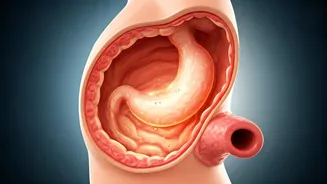What Is Heartburn?
Heartburn occurs when stomach acid surges back up into the esophagus, the tube that conveys food from your throat to your stomach. Typically, a ring-like
muscle called the lower esophageal sphincter (LES) acts like a gate, keeping acid where it should be. However, if this gate malfunctions, acid can splash upwards, generating that familiar burning feeling in your chest or throat. A variety of factors can upset this delicate balance, leading to the unpleasant symptoms of heartburn. Understanding the mechanics of heartburn is the first step toward effective management.
Common Heartburn Triggers
Certain foods are notorious for triggering heartburn, turning a pleasant meal into an uncomfortable experience. Spicy dishes, like curries and anything with chili, are frequent culprits because they can irritate your esophagus and relax the LES. Greasy or fried foods, such as burgers and samosas, also play a role, as they slow down digestion, keeping food in the stomach for extended periods, increasing the chance of acid reflux. Acidic foods, including tomatoes, tomato sauce, and citrus fruits, can directly irritate the esophagus lining. Surprisingly, chocolate, caffeine, and carbonated beverages can also be significant triggers. The first two relax the LES, while fizzy drinks expand the stomach, pushing acid upward. Even everyday ingredients like onions, garlic, and peppermint can cause heartburn for some. Overeating is another major contributor; large portions can overwhelm your digestive system. Keeping a food diary can help you pinpoint your personal heartburn triggers and make appropriate dietary adjustments.
Natural Heartburn Remedies
Fortunately, there are several straightforward, natural strategies to alleviate heartburn symptoms. Recently, a gastroenterologist shared simple yet effective methods. One involves chewing gum, which boosts saliva production, which helps to neutralize stomach acid and wash it back down the esophagus. It also slightly stimulates stomach and intestinal movement, promoting faster food clearance. Diaphragmatic breathing, also known as deep belly breathing, is another useful technique. It reduces pressure in your abdomen and strengthens the muscles that keep acid from rising. Taking a walk after meals can also significantly help. This encourages efficient food movement through your stomach and intestines, thus minimizing the likelihood of acid reflux. These simple lifestyle adjustments can provide significant relief from the discomfort of heartburn.















